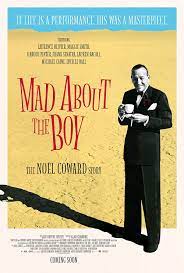
MAD ABOUT THE BOY: THE NOEL COWARD STORY
UK, 2023, 92 minutes, Colour.
Directed by Barnaby Thompson.
In the 1930s, Noel Coward was a celebrity in England and in the United States, a personality in the media, an actor, a significant playwright, a composer of songs with arresting and delighting lyrics. He continued this persona in later decades, contributing to the British World War II effort with the film, In Which We Serve, continuing to write plays and to perform, writing significant screenplays like Brief Encounter, appearing to advantage as a guest star in films like the 1969, the Italian Job, a prison variation of his sardonic persona.
This documentary, narrated by Alan Cumming, with quotations from Coward himself voiced by Rupert Everett, takes the audience through Coward’s life, comparatively poor circumstances, bond with his mother and family, little formal schooling, auditions and acting, success during his teens, self-educated. The film also illustrates how he changed his persona as the years went on, adopting the sophisticated air, the arched tones and intonations of voice, his comic timing and wry humour. There are interviews with David Frost and other television interviewers, scattered throughout the film, illuminating the various aspects explored by the documentary. And, as the title suggests, there are many excerpts from his songs.
A great deal of attention is paid to Coward’s dramatic career in the theatre, in the UK, sailing to the US and overwhelmed by Broadway, his writing of The Vortex, its success, its condemnation by moralists, the continued performances and Coward’s own presence on stage. Which leads to a significant focus on his key play, Private Lives, excerpts, vocal excerpts, his work with actress Gertrude Lawrence.
Noel Coward certainly belongs to past eras, audiences familiar with those decades enjoying this encounter with Coward. He may not be familiar at all with younger generations. And, his very British upper-class accent and attitudes could be offputting.
However, this film with its many quotes from his works, while not a deep exploration of his personality, his homosexuality (presented in a very matter-of-fact way here), or his influence on theatre, cinema, music, it is an opportunity to have a taste of his achievements, to hear him speak (and enjoy his sometimes wry comments, self-deprecating). He had, as he said, “a talent to amuse”.